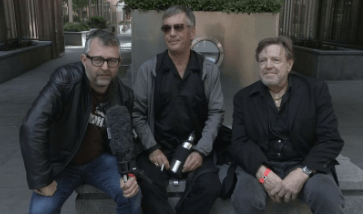Larry Harvey is the main co-founder of the Burning Man festival, while John Perry Barlow is a former lyricist for the Grateful Dead and a founding member of the Electronic Frontier Foundation. We caught up with both men at Le Web London to discuss some of the intellectual underpinnings of startup entreprepreneurship have parallels with Burning Man in what might be their first ever joint interview.
As Barlow points out in the video, early computer culture and the Psychedelia movement grew up alongside each other. There was a “revolutionary zeal in the notion of intellectual empowerment” in Psychedelia which found common cause in tech culture.
During the discussion Harvey points out that Burning Man builds an ephemeral city once a year and bans commercial transactions. Instead, they have pioneered a gift economy which matches much of the “gifting” economics online startups today.
JP Barlow believes we’re returning to a gift economy that actually existed long ago, in former human societies. The ‘scarcity’ economic model which drives much of business today has problems in a new age of potentially limitless space online.
Indeed, points out Barlow, we keep getting encouraged to create scarcity. “I have an artist friend who’s agent invited him to fake his own death to increase the value of his art!” he jokes.
But the collaborative art created at Burning Man is not commercial in the same way, and at the same time it mirrors the world of collaboration online today.
The radical self expression at Burning Man also has parallels in the way Silicon Valley approaches startup culture. Entrepreneurs throw themselves at a problem without knowing if they will succeed, and indeed it’s likely they will fail.
In the same way, the art created at Burning Man can work or it can fail. As Harvey says: “If the unknown isn’t present then art withers”. It’s a phrase that would sound familiar to many entrepreneurs dealing daily with the unknown, but felling all the more driven to create something.
Are they optimistic about a future filled with things like Google Glass?
Both men feel the march of technology itself is not a concern, it’s – in a word – how we “deal with fear”.
“Any powerful technology has sauce for the goose and the gander… It’s just an extension of humanity,” says Barlow. “You can [also] increase your ability to see inside that which is trying to look inside you.”
Harvey believes the often bad reactions to technologies like Google Glass and fears about a future surveillance society are mainly down to irrational, primordial fears.
“We’re caught between fight and flight. I guess we have to go forward,” he says.
Watch to the end for a marvellous story Harvey tells to illustrate this…
[Thanks to Chris Leydon for the camera work.]
